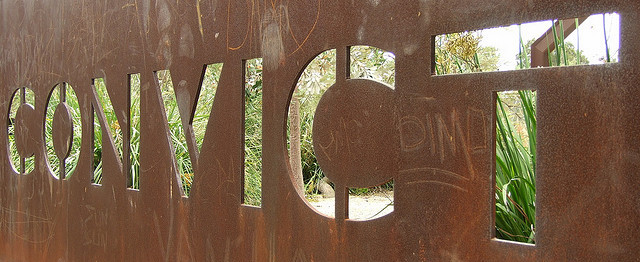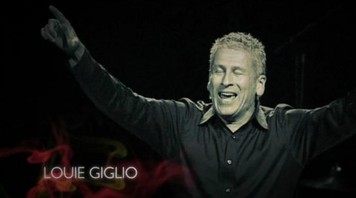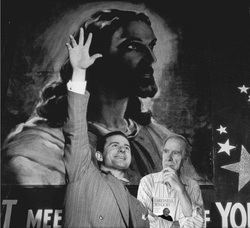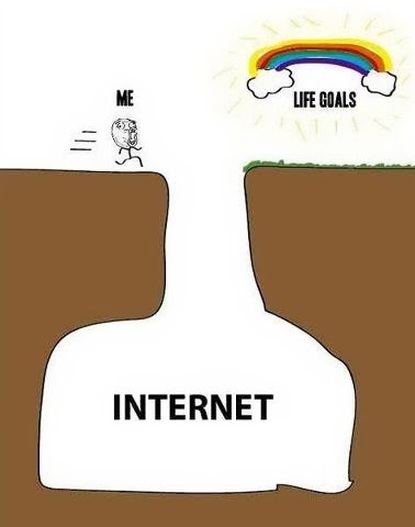|
After seeing the blog post (Pentecost is over?) below this one, I just had to add this amazing quote:
If we consider the unblushing promises of reward and the staggering nature of the rewards promised in the Gospels, it would seem that Our Lord finds our desires not too strong, but too weak. We are half-hearted creatures, fooling about with drink and sex and ambition when infinite joy is offered us, like an ignorant child who wants to go on making mud pies in a slum because he cannot imagine what is meant by the offer of a holiday at the sea. We are far too easily pleased. [CS Lewis] To speak of agendas, our nature, and toilets ... To yield without conviction is no compliment to the understanding of either.” [Jane Austen] And when he comes, he will convict the world [John 16:8]  http://tinyurl.com/p9zufyu http://tinyurl.com/p9zufyu [From the intro to our Wednesday evening discussion on the gifts of the Spirit] The Bible says in Mathew 4:9 “All these things I will give you”. Sounds great, I want that! But in context this actually reads: “... the devil said to Him, all these things I will give You, if You fall down and worship me.” Oops. Not such a great line after all. Phil 4:13 says “I can do all things through him who strengthens me.” Wow ... I want that ... then I can do all things, nothing can hold me back, I will be on top of it all! But the context is on facing troubles and trials and not worrying about it because God will sustain me. Hmmm ... not sure I want that! So CONTEXT is critical. We're so attracted by the supernatural, to power, the unusual, the exotic ... we need to really, really understand the context of the gifts of the Spirit. Jesus introduces the idea that he will send the Spirit in John 14. Here he tells us WHO the Spirit is:
Our role? To choose to accept his presence! Then Jesus returns to the subject in John 16, where he tells us WHAT the spirit will do
Our role? To buy into his agenda to convict, guide into truth, and glorify Jesus. So lets think about the gifts of the Spirit in this context. The gifts are part of the Spirit's nature as a helper, comforter, teacher, reminder. The gifts are to enable his purpose to convict the world, guide into truth, and glorify Jesus. Our role: to make space in our lives for his presence and to work with him on his agenda. You know how people put bricks in their toilet's cistern to save water? The bricks reduce the volume of available water for each flush. It makes the toilet less effective, but sort of works. However, if there are too many bricks, the result can be a stinky residue of brown goo because there's not enough water for a good flush. Jesus says he will send the Spirit: we need to say OK and take out the bricks in our life to make more room for him, and then he can flush things clean. What does it mean to remove the brick ... it starts with desire for the Spirits agenda. Do I want to see the world convicted? Do I want to see them find the truth? Do I want to see Jesus glorified? Do I really WANT (as in, do I feel a yearning)? They're easy words to say, but do I have a desire behind that, or am I simply saying it? If there's no desire, what does that say about how I feel about Jesus? I desire my sports team to win and can't stop talking about it. I desire a relationship with someone and can't stop talking about them? I desire that new mobile phone and fixate on it. I desire ... I desire ... I desire so much. But how little of my heartfelt desire is around the the Spirit's agenda. Our churches can be a sad, sad place for many who go through the motions in their minds while their hearts play adultery with other agendas. Paul commands us to "Pursue love, and earnestly desire the spiritual gifts, especially that you may prophesy." He's saying, desire the gifts because you have a desire to see the Spirit's agenda unfold. Desire prophecy most of all because you want to speak God's truth into the reality that surrounds you, to see the world convicted by the truth, and to see Jesus glorified. This is the foundation we ignore in our rush for the drama of spiritual gifts. The gifts should be a consequence of the relationship with the Spirit to drive our desires, and serve the Spirit's agenda.  Source: http://tinyurl.com/bzzlhvb Source: http://tinyurl.com/bzzlhvb Frustrated /frʌˈstreɪtɪd/ (defn): feeling annoyed and impatient because you are prevented from achieving something. God made all emotions. Like anger -- Jesus showed righteous anger. So there must also be holy frustration! Is there holy frustration in your life? Careful now, think before you answer. Pentecost is a time when I especially feel frustration. I want to live in the power of the Spirit as was seen at Pentecost. It is so sad when we approach Pentecost as a memorial to an event from long ago, instead of a time to express a deep desire to see the Spirit come and change us, our church, our community. You say "But I do desire that!" Careful now, do you really? Or do you desire it only on your terms? One thing I can be certain of is, when I allow the desires God has given me to rise up, then life is never the same, things are turned upside down, everything is rearranged, and surprise becomes my new normal. Realize this: when the Spirit moves, he WILL bring change that many will not like. Church WILL change (but be careful to understand if the change is really of the Spirit or simply of human brokenness). Do you desire a move of the Spirit -- even if that thought disturbs you? I hope you do, but I fear so many only say this without any real yearning. We are so good at suppressing real spiritual desire, and so efficient at maintaining status quo ... if there's one thing about the Spirit it is that status quo is not maintained. So, if you are feeling spiritually frustrated, know that frustration is inevitable for all Christians this side of heaven; we yearn, but in this world we are not perfect and spiritual desires WILL to some extent be frustrated by the weakness in ourselves or in others. Deal with it. Expect it and give thanks that God works all things for good. The scary corollary: If I'm not feeling frustrated in my desires to see God's kingdom come, then something's probably wrong with my Christian walk. (And yet how often do we pray so unthinkingly "may your kingdom come") If I am feeling frustrated in my spiritual experience of Church, how do I, how should I understand it? First, ask what is the basis of my frustration: is it because I am denied a personal desire, or because others are being denied something I have already known from God? Usually it's some of both, but consider these separately:
What if I'm not a leader, but I'm frustrated by my leaders? Well, nothing new there. Ever since the dawn of time people have been frustrated with their leaders. The lesson here is, is my frustration because I think I know better (pride), or because I yearn to respond to the Spirit but the leadership holds me back. Be careful. Both situations are common, but we must be very clear in discerning which is driving us. And if I'm a leader of frustrated people? Well, people are God's gift to leaders. How can you be a leader unless you learn from those you lead? If you are not learning from those you lead, you are, by definition, failing as a leader (and this does not mean a leader just does what people want). Hence we know the essential need for humility by leaders so that they can learn from the Spirit's move among those they lead. Lastly: Frustration does not lead to instant change, but begins a process of change. This Pentecost, be blessed in your frustration, or pray for a motivating desire to get you moving, don't only remember a past event. Ask and allow the Spirit to bring new radical change; seek the Spirits relief to your frustration despite any fear of change. God's change is only scary before we submit, after which it's pure Joy.  http://tinyurl.com/c5osclp http://tinyurl.com/c5osclp As a church we have recently finished 4 Wednesday evenings watching Louie Giglio's 'Indescribable' videos However, the final message was that we are made with incredible detail, and this shows God's wonderful love for me. It was good ... valuable ... lots of discussion ... but ... what is "ME"? Below are three perspectives ... think about it, please! Perspective 1: In January my uncle was buried. Three months before he had been living a normal, busy life when he collapsed one morning and was diagnosed with cancer in his brain and scattered throughout his body. He was very emotional which would be understandable, but the doctors said it was actually because a certain part of his brain was under pressure from a tumor. So his tears were both real but also just a pure biological response. The pressure on his brain made his thinking confused and he lost short and long term memory. He kept forgetting he had cancer and so had to go through the shock and devastation of being told he was going to die, several times. When I flew over to visit him he remembered me but couldn’t always remember my name. His body and his brain were failing him badly. He was buried in a graveyard covered with a thick coat of fresh snow. His body left to return to the elements from which it was made. An amazing construction of atoms and molecules, but one that failed, seemingly before it was supposed to, and returned to being just a pile of atoms and molecules. I love my uncle a lot. Because he is my uncle, but mostly because he was broken and he knew it. Spending time with him you realised that he knew he was broken, but redeemed. Wounded but healed. I never spoke to him about it but I’m pretty sure his love for God is strongly grounded in beating his fists on God's chest and crying out “Why!”. His compassion stems from his own struggles, his humor from his humility, his love from his knowledge that he is loved by God. And he was loved. His funeral was overcrowded with unexpected arrivals. Students he had encouraged to achieve more than the world had told them they could. Colleagues impacted by his humble dedication. Friends drawn to God by his compassion. So I believe that what made my uncle, my uncle, was his cracks, his brokenness. And more than that, how God used my uncle, unique in his brokenness, to impact other lives through relationships. And likewise I believe that what makes me me, is my unique set of cracks and how God is using them to paint something beautiful. Its annoying that I don’t really like mosaics because I think God is the ultimate mosaic artist. Building beautiful pictures from cracked pieces of glass. Its my cracks, being turned into something beautiful by Christ, that makes me ME. Perspective 2: You want to know what makes me ME? Then love me. Live with me. Relate to me. Be patient with me. Forgive me. Help me. Hear me. Show me. Teach me. Laugh with me. Cry with me. Walk with me. Serve with me. Share with me. What was the "me"? My body? No. I don't know how to define me, but I do know the "me" in all of these things is bigger, deeper, more wonderful than any biology. And you can know me. God does! Perspective 3: I'm worried because I think Giglio gave us half a theology. He presents it wonderfully and powerful, but leaves out the better half of the message.
The universe is incredible, yes. We are fearfully and wonderfully made, yes. God paid incredible detail to making me. Trillions of cells in complexity ... no quarrel. Wow. But ... but ... elephants have many, many, many times more cells, molecules, and atoms than I do, does that mean God loves them more than "little" me. Numbers do not make importance. Size does not define value. Numbers and size and scale are awesome messages that God is so much bigger than all that. But, this is not the message God is making, its only one starting point. I am made in God's image ... what make me ME, is the soul he breaths into me. My DNA gives me physical uniqueness, but it is my soul that defines my spiritual identity that is loved by God. My soul and body are intimately bound together, but the "me" that worships, praises, and serves God starts with my soul. The indescribable greatness of God in making "me" is not the biological detail, but that God gives me a soul in His spiritual image ... now that's really WOW. When one day my body is turned to ashes (and my decomposed DNA adds CO2 into atmosphere!) that is not the end of me, because that is not ME. The awesomeness of God is that he gave me a soul to be in relationship with Him!  From Lee Strobel's interview with Charles Templeton (1915-2001) when he was an aged agnostic. Asked what he thought of Jesus: “Well, yes, he is the most important thing in my life,” came his reply. “I . . . I . . . I . . . ,” he stuttered, searching for the right word, ‘I know it may sound strange, but I have to say . . . I adore him!” . . . ” . . . Everything good I know, everything decent I know, everything pure I know, I learned from Jesus. Yes . . . yes. And tough! Just look at Jesus. He castigated people. He was angry. People don’t think of him that way, but they don’t read the Bible. He had a righteous anger. He cared for the oppressed and exploited. There’s no question that he had the highest moral standard, the least duplicity, the greatest compassion, of any human being in history. There have been many other wonderful people, but Jesus is Jesus….’ “Uh . . . but . . . no,’ he said slowly, ‘he’s the most . . .” He stopped, then started again. “In my view,” he declared, “he is the most important human being who has ever existed.” That’s when Templeton uttered the words I never expected to hear from him. “And if I may put it this way,” he said as his voice began to crack, ‘I . . . miss . . . him!” With that tears flooded his eyes. He turned his head and looked downward, raising his left hand to shield his face from me. His shoulders bobbed as he wept. . . . A few years after I was born, my Dad met a stranger who was new to our small town. From the beginning, Dad was fascinated with this enchanting newcomer and soon invited him to live with our family. The stranger was quickly accepted and was around from then on. As I grew up, I never questioned his place in my family. In my young mind, he had a special niche.
My parents were complementary instructors: Mom taught me good from evil, and Dad taught me to obey. But the stranger... he was our storyteller. He would keep us spellbound for hours on end with adventures, mysteries and comedies. If I wanted to know anything about politics, history or science, he always knew the answers about the past, understood the present and even seemed able to predict the future! He took my family to the first major league ball game. He made me laugh, and he made me cry. The stranger never stopped talking, but Dad didn't seem to mind. Sometimes, Mom would get up quietly while the rest of us were shushing each other to listen to what he had to say, and she would go to the kitchen for peace and quiet. (I wonder now if she ever prayed for the stranger to leave.) Dad ruled our household with certain moral convictions, but the stranger never felt obligated to honour them. Profanity, for example, was not allowed in our home - not from us, our friends or any visitors. Our long time visitor, however, got away with four-letter words that burned my ears and made my dad squirm and my mother blush. My Dad didn't permit the liberal use of alcohol but the stranger encouraged us to try it on a regular basis. He made cigarettes look cool, cigars manly, and pipes distinguished. He talked freely (much too freely!) about sex. His comments were sometimes blatant, sometimes suggestive, and generally embarrassing. I now know that my early concepts about relationships were influenced strongly by the stranger. Time after time, he opposed the values of my parents, yet he was seldom rebuked... And NEVER asked to leave. More than fifty years have passed since the stranger moved in with our family. He has blended right in and is not nearly as fascinating as he was at first. Still, if you could walk into my parents' den today, you would still find him sitting over in his corner, waiting for someone to listen to him talk and watch him draw his pictures. His name? We always just called him T.V. He has a wife now....we call her 'Computer.' Their first child is "Cell Phone". Second child was named "I Pod " Third child is Video Games (Source unknown) |
Important: The views expressed on this blog do not necessarily reflect the official position of our church
Like to Write? Archives
June 2015
|


 RSS Feed
RSS Feed

